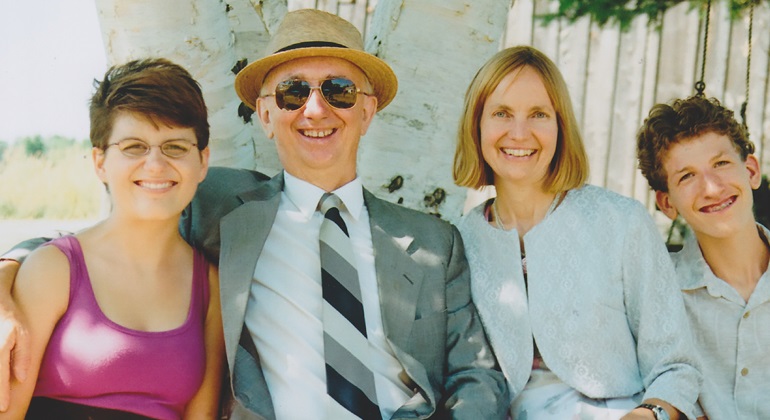For adoptees, home can be a very strange concept.
Being adopted, I have found, means being familiar with many different kinds of love, many varieties of connection. It’s a roller-coaster of sorts. There’s an immense amount of gratitude; yet an overarching sense of loss persists, and permeates every interaction, every decision, and every relationship.
But we are not always allowed to acknowledge this loss. We are told to only be thankful, as though grief and gratitude cannot coexist.
I was born in Rzeszów, Poland, in July 1991. My mother had just turned 15 years old, and her parents made the decision to place me in the local orphanage. My birth mother, upon leaving the hospital, went to town to try to gather details about my whereabouts. They could tell her nothing. The records were sealed.
Wanting to Know Where I Came From
Growing up, I always knew I was adopted. It was not a big deal and certainly not a secret. My parents were very open about our family story, and supportive of my attempts to reach out to my birth mother once I was an adult. I began to do as much research as I could on my own. I do not know much Polish, although I’m learning, and had little information to work with. I started by searching my birth last name. There were not many results. I was disappointed, but I kept trying. I posted in Polish-American forums. I joined genealogy websites. I was hungry for answers. I wanted to know where I came from.
Then I found a man with my last name on Facebook. And he lived in Rzeszów. Could this be a connection? I messaged him. I waited, and waited. Quite frankly, I had forgotten about the message altogether when, almost a year later, I received a reply.
The message was long, written completely in Polish, and signed with a woman’s name. I scanned through quickly and read: The author mentioned the hospital where I was born, the date I was born. It all matched up. “I have been waiting for this moment for 21 years,” she wrote. She had had no idea where I was, and whether I was alive or dead.
The person I had messaged was her son, my biological brother.
I printed out the letter and ran outside to my dad, whose native language is Polish. It was a warm spring day and he was engrossed in yard work. I held the note toward him. “Dad, read this. Please. I think it’s my birth mother. I really think it’s her.” My father abandoned his project, went inside, sat on the couch, and read the note. I watched his eyes dart back and forth. “What does it say?” I inquired eagerly. My dad looked at me. I saw him quickly wipe a tear from his eye before he said, “This is it. This is her.”
Two Real Mothers
I’m going to meet her in 28 days.
This upcoming reunion, I’ve found, has elicited mixed reactions from extended family, acquaintances, and anyone who feels I would benefit from their opinion.
A few weeks ago, someone overheard my conversation and remarked, “Oh, you’re meeting your birth mother? How nice.” I thanked her. Then she continued, “So, where is your mom now?” Confused, I replied, “Well, she’s home right now—” The woman interrupted, “Well, after you meet your birth mother, will she still be your mom?”
How does one respond to a question like that?
A memory from when I was around eight years old resurfaces. “Where’s your real mom?” my friend questioned. “She’s in the kitchen,” I replied, knowing my mom was preparing one of her incredible home-cooked meals. “No, I mean your real mom,” she pushed on. I was getting annoyed. “I just told you. She’s in the kitchen.”
I cannot remember a time when I perceived one mom as more important than the other, one as more loving, one as more “real.” And I never will. My birth mother brought me into this world, and my mom taught me to read, took me to more doctor’s appointments than I could ever count, and helped me with math homework for endless hours. My birth mother gave me so many of her characteristics: her dark, wavy hair, her green eyes, her love of singing and reading books. My mom—and dad—raised me. They encouraged me to go to college, and then grad school.
My mom taught me to self-advocate, and, through her example, how to be a source of gentle support and strength. My mom’s love is a soothing cup of tea after a long day; a tender warmth that I’ve always known I could rely on. And, 4,000 miles away, my birth mother would message me: “I’m sorry I could not raise you.” And almost every day: “I am so sad that I cannot hug you right now.”
To attempt to compare their love is impossible.
My excitement over the prospect of meeting my birth mother has nothing to do with a supposed lack of love or support from my adoptive family. My love for my birth mother does not detract from or negate my love for my adoptive mom.
My thirst and quest for knowledge, for answers, to know more, to know why—has persisted since I was a small child. Seeking my family history and my roots are no different.
Every relationship is complex; to describe only one of my mothers as “real” and not the other does a disservice to both their and my experiences.
There are many kinds of love. And they are all as real, valid, and beautiful as the next.



